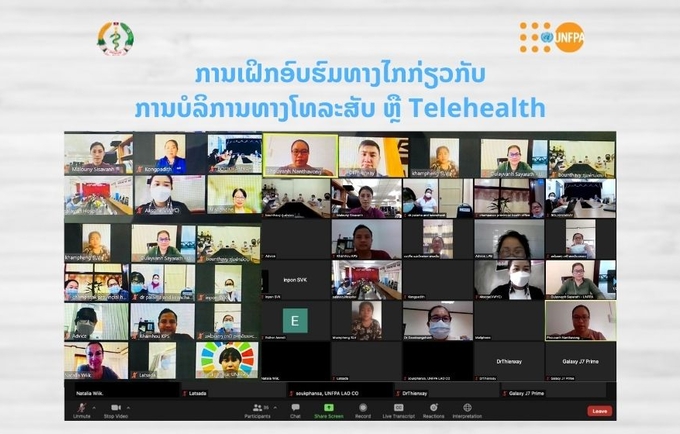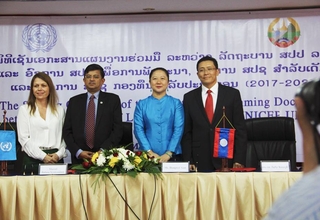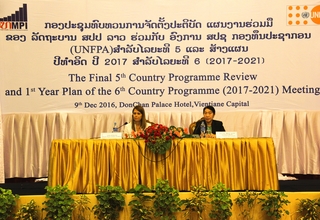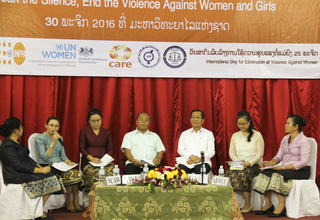Vientiane Capital - 6 September 2021 - The Ministry of Health (MoH) with support from the United Nations Population Fund (UNFPA), in August, have trained 42 health care workers on telehealth in six provinces: Vientiane Capital, Khammouan, Bolikhamxai, Savanakhet, Saravanh and Champasak. Situated with access to the southern borders, these provinces are receiving the bulk of the returning migrants and so have been selected for delivery of maternal and reproductive health to the numerous returning migrants that cross the borders daily.
This capacity building is a variation of the first telehealth effort, piloted in Luang Prabang in 2020, which showed positive results. In Luang Prabang, Midwives in Health Centres were trained to provide telehealth services to women in the community during COVID lockdown.
By scaling up and adapting contents of the telehealth, UNFPA and MoH aim to maintain a high level of responsiveness to women and girl’s needs.
Thousands of Laotian migrant workers are returning daily from Thailand, the COVID infection rate is high amongst them, they transit by the Quarantine Centers and the Isolation Facilities. These facilities are set to control the spread of COVID-19, but have almost no Reproductive Maternal Newborn Child Adolescent Health (RMNCAH) services. Hence the urgency for telehealth for women and adolescents there.
“Telehealth is an innovative service tool. It is the first time that we use such a technique in Laos. We are implementing it gradually, yet the results are already seen. During the lockdown, women could consult the midwives through phone calls and get advice. It worked very well so we said: why not apply it with women at the Isolation Facilities”, said the Director General of Department of Hygiene and Health Promotion, Ministry of Health.
High rates of COVID-19 and consequent isolation/quarantine of those who were in close contact with them, makes the interventions of midwives and other SRH service providers very challenging. Telehealth is the only way to ensure women get the care they need in a timely and effective manner. The 42 trained health care providers will collaborate with the midwives and doctors to provide medical assistance.
“Women will receive care and support through the Telehealth "clinics" in which selected equipment and medication will be available for women. Trained Health providers will follow the instructions of the doctors and midwives. Initially, with the Ministry of Health, we will set up 30 clinics across 30 quarantine centers and isolation facilities”, said Mariam A. Khan, UNFPA Country Representative.
“The current situation of COVID-19 is very alarming as the number of migrant returnees increases. Given that women and children under five are a vulnerable group, therefore, we collaborate with UNFPA and partners to provide health care services that reach our mothers and babies, leaving no one behind,” said the Director of Department of Hygiene and Health Promotion.
Globally, COVID-19 presents a massive shock to already struggling health systems where women, girls are the frontline victims. Maternal health care and sexual and reproductive needs cannot be neglected. UNFPA supports the Ministry of Health commitment to the ICPD25 to make RMNCAH access: universal, available, equitable, uninterrupted leaving no one behind, particularly in times of crisis.
For more information please contact:
Ms. Oulayvanh Sayarath
National Program Analyst, UNFPA Laos
Ms. Vanly Lorkuangming
Communications and Partnership Analyst, UNFPA Laos
Email: lorkuangming@unfpa.org




